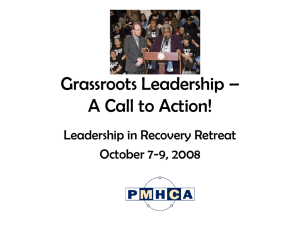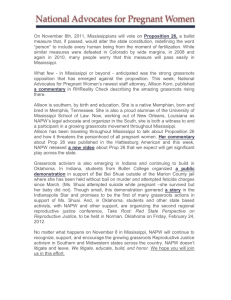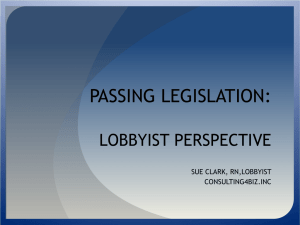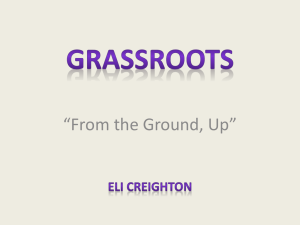GGJBriefingPaperFall05
advertisement
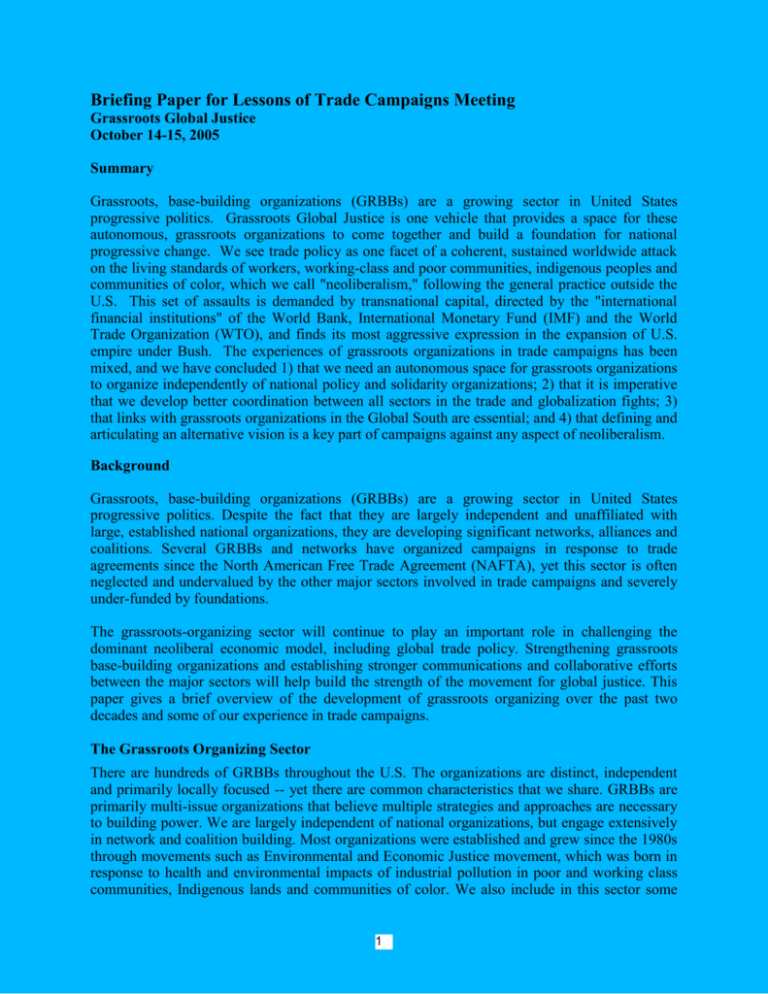
Briefing Paper for Lessons of Trade Campaigns Meeting Grassroots Global Justice October 14-15, 2005 Summary Grassroots, base-building organizations (GRBBs) are a growing sector in United States progressive politics. Grassroots Global Justice is one vehicle that provides a space for these autonomous, grassroots organizations to come together and build a foundation for national progressive change. We see trade policy as one facet of a coherent, sustained worldwide attack on the living standards of workers, working-class and poor communities, indigenous peoples and communities of color, which we call "neoliberalism," following the general practice outside the U.S. This set of assaults is demanded by transnational capital, directed by the "international financial institutions" of the World Bank, International Monetary Fund (IMF) and the World Trade Organization (WTO), and finds its most aggressive expression in the expansion of U.S. empire under Bush. The experiences of grassroots organizations in trade campaigns has been mixed, and we have concluded 1) that we need an autonomous space for grassroots organizations to organize independently of national policy and solidarity organizations; 2) that it is imperative that we develop better coordination between all sectors in the trade and globalization fights; 3) that links with grassroots organizations in the Global South are essential; and 4) that defining and articulating an alternative vision is a key part of campaigns against any aspect of neoliberalism. Background Grassroots, base-building organizations (GRBBs) are a growing sector in United States progressive politics. Despite the fact that they are largely independent and unaffiliated with large, established national organizations, they are developing significant networks, alliances and coalitions. Several GRBBs and networks have organized campaigns in response to trade agreements since the North American Free Trade Agreement (NAFTA), yet this sector is often neglected and undervalued by the other major sectors involved in trade campaigns and severely under-funded by foundations. The grassroots-organizing sector will continue to play an important role in challenging the dominant neoliberal economic model, including global trade policy. Strengthening grassroots base-building organizations and establishing stronger communications and collaborative efforts between the major sectors will help build the strength of the movement for global justice. This paper gives a brief overview of the development of grassroots organizing over the past two decades and some of our experience in trade campaigns. The Grassroots Organizing Sector There are hundreds of GRBBs throughout the U.S. The organizations are distinct, independent and primarily locally focused -- yet there are common characteristics that we share. GRBBs are primarily multi-issue organizations that believe multiple strategies and approaches are necessary to building power. We are largely independent of national organizations, but engage extensively in network and coalition building. Most organizations were established and grew since the 1980s through movements such as Environmental and Economic Justice movement, which was born in response to health and environmental impacts of industrial pollution in poor and working class communities, Indigenous lands and communities of color. We also include in this sector some 1 farm worker organizations and workers' centers started within the last 40 years, as well as progressive labor-community coalitions like Jobs with Justice and independent unions such as United Electrical, Radio and Machine Workers of America, with histories as far back as the 1930s. Grassroots, base-building organizations represent the people that are most affected by globalization: poor and working people, people of color, Indigenous communities, and immigrants. For the most part GRBBs focus on building organizations that empower community and rank and file leaders through collective strategies, leadership development and direct organizing. Our constituencies represent a broad cross-section of the United States. Community Voices Heard organizes single mothers on welfare in New York City. The Farm Labor Organizing Committee is an organization of immigrant farm workers in the fields of Ohio and North Carolina. Displaced factory workers in Tennessee organized the Tennessee Economic Renewal Network. School maintenance workers in San Antonio organize through Southwest Workers Union. The Labor Community Strategy Center rallies low-income bus riders into a union in Los Angeles. The Indigenous Environmental Network links organizations in Native communities throughout the U.S. and Canada to confront issues of environment, health, land use and sovereignty. Our members’ campaigns range from healthcare access to environmental justice, fair wages and safe workplaces. Grassroots Global Justice is one vehicle that provides a space for these autonomous, grassroots organizations to come together and build a foundation for national progressive change. Our aim is to affect public policy at all levels by strengthening the work of our member organizations and by creating dialogues and activities that allow our members to develop policy that is informed by both our grassroots nature and an international, global perspective. We see important distinctions between GRBBs and national policy and solidarity organizations involved in trade campaigns. Although policy organizations may also focus on a variety of issues and build a broad base, there is less emphasis on developing a structure and process of decisionmaking and accountability to their base and in developing leadership from their constituency. The emphasis of the work of policy organizations is to advocate for policy changes and mobilize constituencies through legislative campaigns. Solidarity organizations create support infrastructure in the U.S. for movements in the Global South. They also do not focus on developing leadership and building a membership base that responds to local conditions. We recognize these efforts are necessary, but it is important to understand that the work of the grassroots-organizing sector is a crucial centerpiece for building a winning and sustainable progressive movement in the U.S. and to challenge neoliberal global policies. Neoliberalism, Empire, and a Progressive Response We work in an age of a coherent, sustained worldwide attack on our constituencies, which we will call "neoliberalism," following the general practice outside the U.S. Neoliberalism is a set of assaults on the living standards of workers, working-class and poor communities, indigenous peoples and communities of color. Neoliberalism has its roots in a long legacy of colonialism and imperialism by the industrialized countries and trans-national corporations. It expresses itself as governmental and corporate initiatives to lower wages; to scale back, eliminate or privatize public goods (social security, health care, public education, utilities, social programs); and to weaken or eliminate regulations which protect the environment, workers' rights, and public health. Neoliberalism is also an assault on the rights of indigenous peoples, including the 2 right of self-determination and the right to land and water; in many Latin American countries, neoliberal regimes have resulted, or will result in loss of land (privatization) causing migration into urban centers. The same forces target indigenous, poor and working people, and natural resources both within the United States and the Global South. These attacks are demanded by transnational capital and directed by the "international financial institutions" of the World Bank, International Monetary Fund (IMF) and the World Trade Organization (WTO). While the Bush administration has pursued these attacks with a breathtaking audacity and aggressiveness, neoliberalism dates back at least to the ReaganThatcher era, and we recognize that Clinton worked from within the basic framework of neoliberalism, being responsible for two of its great triumphs within the U.S.: so-called “Welfare reform” and the North American Free Trade Agreement. Bush has replaced the multilateral approach of the Clinton administration, which successfully established both NAFTA and the WTO, with one of naked imperial ambition. In so doing, Bush has alienated the leadership of most of the rest of the industrialized countries, and has made resistance to American imperialism a mainstream position throughout much of the world, making possible, for example, the victory of the Socialists in the Spanish elections of spring 2004 on an antiwar platform. This is part of the political context that made the G21 opposition in Cancun possible. Furthermore, the overextension of the U.S. military in the quagmire of Iraq has made it more difficult for the U.S. to strong-arm individual governments; without the Iraq disaster, Bush would likely be pursuing "regime change" in many democracies with governments skeptical of the neoliberal agenda, especially in Latin America. The Iraq war also generated substantial domestic resistance, with the emergence of a strong peace movement as a significant political force in the U.S. for the first time in over a decade. The massive cost of the war to the American government has also been used by the Bush administration to impose "austerity" or "structural adjustment" on social programs in the U.S., as state and now federal budgets are strained to the breaking point, and this has generated resistance among grassroots organizations, as well as skepticism of the competency of the Bush administration among many power holders. However, needless to say, the substitution of brute military force for diplomacy in achieving U.S. government aims has made the world a much more dangerous place, and the domestic attacks on civil liberties has made political organizing within the U.S. more difficult and, for some, more dangerous. Experiences of the Grassroots Organizing Sector in Trade Campaigns By the early 1990s many GRBBs had joined to form strong regional networks and consolidated a powerful movement of grassroots communities and workers (particularly migrant workers) for environmental and economic justice. The movement is international in its perspective reaching out to popular movements in other countries. The Southwest Network for Environmental and Economic Justice (SNEEJ), for instance, deepened ties with groups in Mexico to address the environmental and health disasters created by unregulated industrial pollution along the border. SNEEJ eventually became a bi-national network with member organizations from border states in the southwestern U.S. and northern Mexico. The Indigenous Environmental Network (IEN) made connections as far as South America connecting on issues of land rights, land-use and 3 sovereignty. Together these forces developed an intense campaign against the North American Free Trade Agreement (NAFTA) and thus entered the struggle for global justice. NAFTA sparked an intense public and media debate, becoming a central issue in the 1992 Presidential race. Unfortunately, most of the discussion focused on the “giant sucking sound” concept of billionaire Ross Perot and the labor movement’s narrowly self-interested concern regarding the loss of U.S. manufacturing jobs. Despite the efforts of many GRBBs, important opportunities were lost to build bridges between workers and communities in the U.S. and their counterparts in Mexico and Canada. Furthermore, the focus on NAFTA as a trade agreement, rather than as an instrument of an overall neoliberal policy, led to a false separation between “trade” and “immigration” issues and allowed the swap of 'amnesty' for support for NAFTA at the Human Rights conference in Reynosa, Mexico, driving a wedge between those fighting NAFTA and those struggling for migrants' rights. Finally, the NAFTA struggle, like many subsequent trade campaigns of the North, did not adequately include the active participation of Indigenous peoples. Eventually, the traditional labor movement, environmental organizations and conservative civil rights organizations like the League of United Latin American Citizens, Southwest Voter Registration and Education Project and others gave in to the notorious Clinton compromise, creating labor and environmental side agreements that have had almost no positive impact. In fact, NAFTA’s implementation has wreaked havoc throughout North America, displacing millions of Mexican people from their land, leading to a decades long Diaspora of more than 5 million Mexicanos into the United States, facing persecution at the border and racism within the U.S. borders. The once welcoming U.S.-Mexico border has become a war zone, with the U.S. military, racist vigilantes and drug cartels descending on the region. The natural environment has continued to deteriorate as the North American Development Bank created by the NAFTA side agreements has failed to fund needed infrastructure along the border. Meanwhile NAFTA’s Chapter 11 provisions neutralize any meager gains from the side agreements to protect the labor, environmental, and human rights. GRBBs were among the first to respond to NAFTA's implementation with strategies of international solidarity. The United Electrical, Radio and Machine Workers of America (UE) established ties with the Authentic Labor Front (FAT) in Mexico and began to articulate campaigns from the common experiences of workers on both sides of the border. Groups like the Tennessee Industrial Renewal Network (now Tennessee Economic Renewal Network) connected displaced workers from factories in Tennessee with workers who now held those jobs in Ciudad Juarez and other maquiladora (twin plant) centers. The Coalition for Justice in the Maquiladoras brought together faith-based, labor and community-based organizations into a coordinated effort to respond to labor, health and environmental conditions in the maquiladoras. The Battle in Seattle and the FTAA In 1999, a more militant, uncompromising movement greeted World Trade Organization (WTO) in Seattle. The Battle of Seattle marked a watershed moment in the development of the Global Justice movement. The primary axes of U.S. labor and environmental organizations led this effort, mobilizing large contingents numbering tens of thousands of people. Policy organizations like Public Citizen, Global Exchange, Friends of the Earth and Greenpeace emerged as players in the globalization struggle. The “Battle in Seattle” also highlighted the presence of a strong “direct action” movement, mainly white middle-class youth who organized bold and creative 4 direct actions. The Battle in Seattle shocked the U.S. public because of the intensely violent response of the police forces, and it began to turn the tide on trade policy. Founders of the World Social Forum (WSF) cite the Battle in Seattle as an event that sparked the evolution of the WSF process. Jobs with Justice (JwJ) played a key role to mobilize progressive labor-community presence in Seattle and surfaced as an important organization in trade and globalization issues. JwJ has organized 40 local coalitions throughout the U.S. and established international alliances with groups in the Global South. The organization has since mobilized worker and community leaders to the FTAA actions in Quebec, the World Bank and IMF actions in Washington, D.C., and the Summit of the Americas meeting in Miami, Florida in 2003. Overall, however, the independent grassroots-organizing sector did not have a strong presence in Seattle. Small delegations of environmental justice organizations were there, but dispersed until IEN & SNEEJ rallied them into a united front. The two networks organized a forum to develop a grassroots global justice perspective independent of the labor federation and environmentalists. In 2001, as the Free Trade Area of the Americas (FTAA) negotiations were heating up in Quebec and we marked the 7th year of NAFTA with clear documentation of its disastrous impact on working people and communities in all three countries (see the Economic Policy Institute’s briefing paper NAFTA at Seven), US organizations launched a campaign to stop FastTrack/Trade Promotion Authority that gives the Bush Administration’s power to negotiate trade agreements without the input of Congress. The two-year campaign to defeat Fast-Track, which led to two narrow votes at the Senate and the Congress (eventually renewing Fast-Track) was an important moment of coordination between grassroots organizations with constituency in key districts and NGOs that function on Capitol Hill. With a Republican Administration, it seemed more likely to get “Free Trade Democrats” to reject Fast-Track, yet our defeat was a sign of how difficult it would be to sway the overall bi-partisan neo-liberal ideology that more recently enacted the Dominican Republic-Central American Free Trade Agreement (CAFTA). Grassroots organizations engaged in the Fast Track and CAFTA fights through legislative work that include delegations to elected officials, postcard campaigns, speak-outs, and direct actions on elected officials by their own constituents. In both fights, these actions led key elected officials who were thought to vote against us actually voting with us – some surprise Republicans and “Free Trade Democrats.” This demonstrated the power of grassroots organizations that can organize in specific districts and constituencies to make sure elected officials represent the interests and opinions of the people who actually vote for them. The 2001-02 Fast-Track and the 2004-05 CAFTA fights have surfaced lessons in challenges and opportunities in collaboration between grassroots organizations and NGOs that function primarily in Washington, DC. The opportunities would be a coordinated effort that utilizes the strengths of DC activities led by DC organizations and local activities led by grassroots organizations. Unfortunately, the experience of several grassroots organizations has been that of competition with DC organizations rather than collaboration. Some of our challenges arise from disagreements about who should drive the strategies and tactics of a campaign – the DC organizations that are counting votes on Capitol Hill or the grassroots organizations that work year-round to hold their elected officials accountable. While it is helpful for NGOs to communicate with grassroots organizations about specific targets and key districts, grassroots 5 organizations should then be given the resources and political space to assess what are the best strategies and tactics to move their elected officials. This has not been the case, instead we have seen NGOs enter our communities with resources and their own plan, which often leads to infighting rather than collaboration. There is also a perceived lack of respect for the day-to-day base-building work of permanent grassroots organizations that create infrastructure for a shortterm campaign on a specific issue, which the NGOs can then take advantage of. As we look at the need to strengthen the progressive movement in the US, we have to acknowledge the importance of permanent multi-issue grassroots organizations that work on overall transformation and can then take up specific campaigns in a timely manner. In Miami in 2003, the global justice movement realized the culmination of a series of successes as the negotiations for the Free Trade Area of the Americas (FTAA) were brought to a halt. Grassroots organizations re-emerged and began to define a unique space of action against the neoliberal trade agenda within the U.S. The Miami Workers Center, Power U and the Coalition of Immokalee Workers brought together organizations representing poor, working class, people of color and immigrant worker constituencies to mobilize the “Root Cause” march. It was here that the organic process of organizing and movement building came together to form a new independent power base. For the grassroots, base-building groups that were there, the march and rally highlighted the root causes of social, economic and environmental injustices, and acknowledged that our movement seeks systemic change that challenges racism and classism. Opposition to Neoliberalism outside the U.S. The long struggles of social movements in the "Global South" against neoliberalism have begun to bear fruit as governments have started to stand up to the international financial institutions and the wealthy industrialized countries that dominate them. The most notable instance was the successful organization of the "Group of 21" (G21) Global South countries to oppose the rich countries at the WTO meeting in Cancun. Inside the meeting, the G21 countries successfully opposed the agricultural agenda of the rich countries while surrounded by militant demonstrations led by campesinos and farmers, symbolized most dramatically by the Korean farmer who took his own life at the barriers. Recent elections throughout Latin America and in India, have also been seen as evidence of widespread rejection of neoliberal prescriptions, and the progressive governments of Lula in Brazil and Hugo Chavez in Venezuela have played key roles in changing the terms of debate for "free trade" at both the WTO and in the negotiations for the Free Trade Area of the Americas. Furthermore, many of the social movements who are responsible for this are using the World Social Forum to deepen their connections with social movements in other countries, to build links between social movements in the Global South and popular organizations in the core industrialized countries, and to articulate an alternative vision of global economic integration. The increased strength and internationalism of the social movements is perhaps most significant in Latin America, where governments skeptical of neoliberalism have come to power in many countries, and strong movements of workers, peasants and indigenous peoples have been able to extract significant concessions from those in power. Grassroots Global Justice was born out of the necessity for the U.S. grassroots sector to connect with these movements in the Global South; a number of grassroots organizations that originally attended the World Social Forum in 2001 or 2002 at the initiative of funders gathered in Chicago 6 in June of 2002 to form GGJ and a major activity of GGJ has been organizing delegations of U.S. grassroots organizations to the World Social Forums in 2003, 2004, 2005 and the upcoming 2006 WSF. Out of these delegations important ongoing relationships have been built between U.S. grassroots organizations and their counterparts in the Global South, for example between Southwest Workers' Union and Project South and the Convergence of Movements of Peoples of the Americas (COMPA), between Community Voices Heard and CONGESCO, a community organization in the favelas of Brazil, and between Jobs with Justice and the New Trade Union Initiative in India. Conclusions In recent years, progressive forces in the United States have suffered significant political setbacks: the failure to prevent the invasion of Iraq and Afghanistan, the failure to defeat Bush and the right-wing regime’s rise to control all branches of the federal government, and the passage of the Dominican Republic - Central America Free Trade Agreement. Although the Global Justice movement has been successful in building strength at the international level and winning victories in Europe, Latin America and South Asia, social change organizing within the United States has not achieved a level of strength to counter the neoliberal agenda nationally. Here are some of our thoughts to build greater progressive political power within the U.S. on trade and globalization: Grassroots Organizing is essential – In this era of politics focusing on think-tanks and media messages, fundamental efforts to build strong, grassroots organizations will make the difference in creating change in the United States. All of the "local" or "day-to-day" struggles that our organizations are involved in are placing our organizations fundamentally at odds with some aspect of the neoliberal agenda. A key objective will be to link these struggles and the local experience of people to global policies and strategies of corporate and government elites, without making the local struggles subservient to campaigns directed from above. Enhancing our capacity to provide Popular Education is also essential in raising consciousness about the effects of globalization in our communities. Develop Better Coordination between all Sectors in the Trade and Globalization Fights – To build a successful and sustainable progressive movement to fight neoliberal trade policy, we need to develop strong and accountable collaborative efforts between the various sectors involved, based on standards of inclusivity such as the “Jemez Principles.” Build common cause between the U.S. and the Global South – Trade campaigns must help further understanding of the plight of people in the Global South, and strengthen solidarity between communities and workers in the U.S. ant the Global South. Opposing trade agreements solely because of the issue of losing jobs in the U.S. is a narrow and unproductive position. Developing joint positions and organizing strategies with our counterparts in the Global South will lead to solutions that can benefit all constituencies. Legislative strategies are just one piece. It is in everyone’s interests that GRBBs develop and deepen relationships with our counterparts in the Global South. We need to develop collective winning strategies that are based in the experience of poor people in the Global South and the Global North. 7 Define and articulate an alternative vision - Successful resistance to the neoliberal agenda, in either its Republican or Democratic flavors, will require a solid, alternative vision that has broad resonance among all constituencies who are the targets of that agenda, united and militant action by the organizations which represent those constituencies, and a serious commitment on the parts of those organizations to grappling with the significant divisions within our movement which were papered over for the sake of temporary unity around the election -- most importantly race and racism; the appeal to significant chunks of our membership/constituencies of right-wing "populist" views on homosexuality and women's rights (especially reproductive rights); and the question of how unions and community organizations can work together.Member Organizations of Grassroots Global Justice 50 Years Is Enough Network (Washington, DC) Afroecophilo - African American Ecological Philosophy Group (Minneapolis, MN) Appalachian Development Projects Coalition (Appalachia) CAAAV: Organizing Asian Communities (Bronx, NY) Coalition of African, Asian, European and Latino Immigrants of Illinois (Chicago, IL) Coalition of Immokalee Workers (Immokalee, FL) Comite de inmigrantes en Accion de Rhode Island Community Voices Heard (New York City) Cross Border Labor Organizing Committee (Portland, OR) Domestic Workers United (New York City) Environmental Health Coalition (San Diego, CA) Farm Labor Organizing Committee (Ohio, Michigan, North Carolina) Fuerza Unida (San Antonio, TX) Georgia Citizens' Coalition on Hunger Indigenous Environmental Network (National) Jobs with Justice (National) Just Transition Alliance Kentucky Jobs with Justice Labor Council for Latin American Advancement (Mass. chapter) Labor/Community Strategy Center (Los Angeles) Los Angeles Alliance For A New Economy (Los Angeles) Massachussetts Jobs with Justice National Network for Immigrant and Refugee Rights (National) New York City Aids Housing Network PACE Local 8-675 (Southern CA & Nevada) People Organized in Defense of Earth and her Resources (PODER) (Austin, TX) People Organizing to Demand Environmental & Economic Rights (PODER) (San Francisco) Portland Jobs with Justice Project South (Atlanta, GA) Sage Council (New Mexico) Southeast Regional Economic Justice Network (Southeastern US) Southwest Network for Environmental and Economic Justice (Binational) Southwest Organizing Project (Albequerque, NM) Southwest Workers' Union (San Antonio, TX) Strategic Concepts in Organizing and Policy Education (Los Angeles, CA) Tenants & Workers Support Committee (Northern Virginia) Tennessee Economic Renewal Network 8 United Electrical, Radio & Machine Workers of America (National) United Students Against Sweatshops (National) Vermont Workers' Center “JEMEZ PRINCIPLES” FOR DEMOCRATIC ORGANIZING #1 Be Inclusive If we hope to achieve just choices that include all people in decision-making and assure that all people have an equitable share of the wealth and the work of this world, then we must work to build that kind of inclusiveness into our own movement in order to develop alternative policies and institutions to the treaties and policies under neo-liberalism. This requires more than tokenism, it cannot be achieved without diversity at the planning table, in staffing, and in coordination. It may delay achievement of other important goals; it will require discussion, hard work, patience and advanced planning. It may involve conflict, but through this conflict, we can learn better ways of working together. It’s about building alternative institutions, movement building, and not compromising in order to be accepted into the anti-globalization club. # 2 Emphasis on Bottom-Up Organizing To succeed, it is important to reach out into new constituencies, and to reach within all levels of the leadership and membership base of the organizations that are already involved in our networks. We must be continually building and strengthening a base which provides our creditability, our strategies, mobilizations, leadership development, and the energy for the work we must do daily. #3 Let People Speak For Themselves We must be sure that relevant voices of people directly affected are heard. Ways must be provided for spokespersons to represent and be responsible to their affected constituencies. It is important for organizations to clarify their roles, who they represent, and to assure accountability when our structures. #4 Work Together In Solidarity and Mutuality Groups working on similar issues with compatible visions should consciously act in solidarity, mutuality and support each others work. In the long run, a more significant step is to incorporate the goals and values of other groups with you own work in order to build strong relationships. For instance, in the long run, it is more important that labor unions and community economic development proyects include the issue of environmental sustainability in their own strategies, rather than just lending support to the environmental organizations. So communications, strategies , and resource sharing is critical to help us see our connections and build upon these. #5 Build Just Relationships Among Ourselves We need to treat each other with justice and respect, both on and individual and organizational level, in this country and across borders. Defining and developing “just relationships” will be a process that won’t happen overnight. It must include clarity about decision-making, sharing strategies, and resource distribution. There are clearly many skills necessary to succeed, and we need to determine the ways for those with different skills to coordinate and be accountable to one another. #6 Commitment To Self Transformation As we change societies, we must change from operating on the mode of individualism to communitycenteredness. We must “walk our talk”. We must be the values that we say we’re struggling for--we must be justice, peace and community. (adopted on December 8, 1996, by the people of color participants during the pre-meeting portion of the “Working Group Meeting on Trade and Globalization” in Jemez, New Mexico hosted by The Southwest Network for Environmental and Economic Justice.) 9
